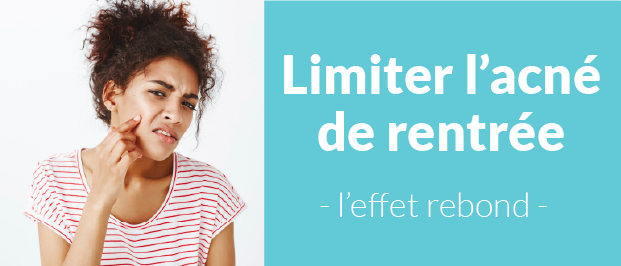Acne is a common skin problem that can affect people of all ages. If you have noticed a sudden worsening of acne at the beginning of September, it is possible that you are experiencing rebound effect, a phenomenon related to the seasonality of the skin. In this article, we will explore the rebound effect in more detail and provide you with tips to prevent and treat acne associated with this particular phenomenon.
Understanding the rebound effect
The rebound effect of acne at the start of the school year is a biological phenomenon that occurs as a result of seasonal changes. During the summer months, the skin reacts to increased sun exposure by thickening its outer layer, the stratum corneum (or horny layer). This natural adaptation aims to protect the skin from damage caused by UV rays.
However, when the September return arrives and sun exposure decreases, the superficial layer of the skin begins to gradually thin. This can disrupt the skin's balance and make it more prone to acne.
The causes of the rebound effect
Several factors contribute to the rebound effect of acne at the start of the school year, including:
- Thinning of the Stratum Corneum
The thinning of the stratum corneum is the key characteristic of the rebound effect. In summer, this layer of skin thickens to protect itself from UV rays. At the start of the school year, it begins to regain its normal thickness, making the skin more sensitive to acne triggers.
- Hormonal Changes
The return in September can also be accompanied by hormonal changes, particularly in adolescents and young adults. These hormonal fluctuations can promote acne.
- Back to School Stress
The return to school is often synonymous with stress, whether for students resuming classes, parents organizing family life, or professionals returning to work after vacation. Stress can exacerbate skin issues, including acne.
How to prevent and treat acne
Now that you better understand the rebound effect of acne at the start of the school year, here are some tips to prevent and treat this condition:
- Skin Care
You can limit this rebound effect in several ways, the first and universal one being to keep your skin well hydrated and not to forget sunscreen.
Then, we can gradually resume the peels in the areas where the climate is the grayest. (In the south of France, it is too early; one must be careful of the sun.)
Next, we can also resume mesotherapy; here are some serums that we recommend for you:
- STAYVE AC Stem Cell Gold: Centella Asiatica calms inflammation and thus helps to reduce acne. The 99.9% pure gold powder purifies, repairs, and illuminates the skin.
- Vitamin A MCCM: Vitamin A is beneficial due to its moisturizing properties, providing a more radiant and even complexion. It gives the skin a smoother appearance. Vitamin A is also recommended for oily and acne-prone skin, as it helps stimulate collagen production, a substance beneficial for skin firmness.
- Centella Asiatica MCCM : Asian Centella is an effective "all-in-one" treatment for cellulite, skin rejuvenation, hair loss, and stretch marks, in addition to being an interesting antioxidant.
- Biotine Hixidrin MCCM: Vitamin B8 is essential for the renewal of skin, nail, and hair cells.
- Balanced Diet
Maintain a balanced diet rich in fruits, vegetables, and antioxidant-rich foods to support the health of your skin.
- Avoid Touching Your Face
Avoid touching or pressing the buttons to prevent inflammation and scarring.
The rebound effect of acne at the start of the school year can be a challenge, but by understanding its causes and adopting appropriate skincare habits, you can minimize its impact and enjoy healthier skin throughout the year. If acne persists, do not hesitate to consult a dermatologist for tailored advice and treatments.































































